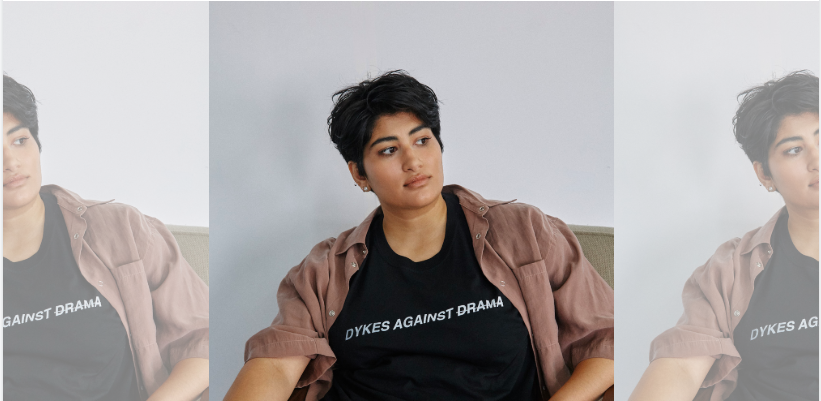
Music has always been important in my family. It ended up being even more important to me as I embraced my queer desi identity. When my dad was a teenager in India, other people in his building would complain because he would blast U2 all night. I remember being in the car as a small child singing “Maa Tujhe Salaam” at the top of my lungs with my sister and dad. I remember my mother singing to us when we were falling asleep, when we were sick, when we’re upset; basically any time we needed comforting. My parents also made my sister and I learn how to play instruments from a very young age.
I didn’t realize just how powerful music was until I was 13, when I realized I liked girls. I always had music in my life because of my parents, but at 13 I started creating music and found it was the perfect place to let out the feelings that I didn’t think I could share with anyone as a queer desi person. While a lot of people kept a diary, I wrote songs. Almost every song I wrote contained lyrics that either referred to my queerness or the mental health issues that came from repressing myself constantly. However, the lyrics never outright stated these things because I would share these songs with people and didn’t want them to know. Some of the lyrics I wrote include “show me the light and I won’t stay hidden anymore” and “I see colorful skies and all you see is blue.”
[Read More: 10 LGBTQ+ Children’s Books to Read Your Kids This Pride Month]
I eventually came out to my family when I was 15 and while their reaction was definitely better than what’s expected from the average desi parents, it still took a toll on our relationship at the time. My parents didn’t necessarily have a problem with people in the LGBTQ+ community in general, they just weren’t on board with their own child being one of those people. They told me I wasn’t allowed to tell anyone, it was a phase, I was confused…all the stuff you commonly hear parents saying to their newly out queer/trans kids. So even though I wasn’t fully in the closet anymore, I still didn’t have supportive people to whom to turn. I started writing love songs about the girls I had crushes on at school, but very purposefully used gender-neutral pronouns in the lyrics, partly to keep my parents happy and partly to make sure people still didn’t catch on.
In the latter half of my junior year of high school, I finally decided to come out to a few friends and eventually, on the last day of school, I came out fully on Instagram. Although my parents were definitely not happy about it, me being out to everyone eventually forced them to come to terms with my identity being a reality and not just something we whispered about here and there. I also, of course, had my fair share of aunties and people at school who were ignorant about it, but the overall response was very positive and it was the freest I had felt in years.
At this point, I finally had the option of writing whatever I wanted in my songs. The first time I wrote the word “she” in a love song was both terrifying and exciting. I was told by numerous people that even though I was queer, I shouldn’t use she/her pronouns in my songs because it would make fewer people relate to the song. I thought this was funny because I grew up listening to almost exclusively straight songs and I still found a way to relate, so I decided not to listen to them and stick with my gut. By the end of my senior year of high school, I was singing a song about falling for a straight girl for a school performance and everyone cheered for me. I ended up releasing that song on my album and was told by numerous people that it was their favorite song of mine.
[Read More: 5 Books that Portray the South Asian LGBTQIAP+ Experience]
When I got to college and met people who didn’t know I was queer, some of them were confused by my songs. They would say things like, “Wait, why did you say she in that song? Is it about a friend?” or “Oh are you writing it from the perspective of a guy?” This was extremely frustrating, especially because often after telling them “No, I’m gay,” they would respond with some kind of excuse about how they had never met a queer desi person before. This experience combined with meeting a lot of other people who were part of the LGBTQ+ community who were craving representation in music made me decide I wanted my queerness to be central to any kind of artistry I pursue because clearly there was a need for it.
Music has always been a source of healing for me, whether it was the comfort of my mom singing to me, listening to Bollywood music in the car, or writing lyrics. I want nothing more than to help others experience that healing as well. I know that if I had had someone like me to look to in the media, I would have suffered a lot less. I recognize that not every queer desi person has the privilege to be as open about their identity as I do, so I’d like to use that privilege to do as much as I can to give people like me a voice. Through my music, social media, and any other projects I do along the way, I hope to bring people like me into the spotlight and give my community the love we deserve. I want to be the person I wished I had when I was growing up.




